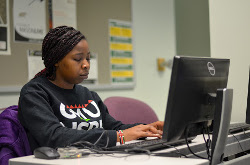Since its inception in 2009, the Honors College has worked to highlight the diverse range of student voices present in its student community. However, until recently, the college lacked a formalized representative body for its students to have a voice in shaping the Honors College experience. Honors College Professor Blake Silver’s Diversity and Representation in Student Governance course was tasked with determining how to fill this gap in Fall 2018.

Dr. Blake Silver
Dr. Silver’s Honors 330 class was comprised of nine students, representing a diverse mix of academic disciplines, life experiences, and backgrounds,. The group began the course by reading about issues in democracy and evaluating case studies to learn about what makes boards successful. Some students participated in the VA Engage Network Annual Fall Meeting last October to learn more about civic engagement and representation in classroom settings.
The Honors 330 cohort created questions for Honors College student leaders, administration, and faculty involving how they envisioned the role of a Student Advisory Board and how they would like it to function.. These questions became the basis for interviews that were conducted by the student researchers with members from each of those three groups.
While deciding who would serve on the board and how they would be selected, the students discovered how complex it is to create effective representation.
Abby Butler-Cefalo, a sophomore Integrative Studies major with a concentration in Social Justice and Human Rights, expressed that she hopes the board will increase the representation of underserved communities within the Honors College, such as off-campus first-year students.

Doreen Joseph
Throughout her years in the Honors College, senior Doreen Joseph has noticed how difficult it is to ensure students’ voices are being heard, especially those of underrepresented backgrounds and disciplines.
“I’ve seen how hard it is to get certain groups of students to participate in leadership in the Honors College, so just thinking about how we can bring out those student groups and making sure their voices are heard was a challenge,” the cyber security engineering major said “I think we did really well.”
Joseph also serves on the ad hoc committee that will help the new board transition into their roles.
By the end of the course, the group created a board that will have representatives from each class year, including both on- and off-campus students. Individual representatives will also serve as liaisons between the various organizations affiliated with the Honors College and the board itself.
The class designed processes and procedures for holding meetings, forming committees, utilizing campus resources, and seeking faculty support.
The students in this course worked hard to consider important questions about how the representatives on the board will interface with faculty and other students, as well as how the board could sustain itself over time.
Dr. Blake Silver
Members of the inaugural board have already been selected and are preparing to lead the board based on the practices and procedures established Dr. Silver’s class. However, much of what the board will look like falls into the hands of the initial representatives.
Both Butler-Cefalo and Joseph encourage the board members to define how they will operate.
“The hope is [that] the board continues to evolve,” said Butler-Cefalo, emphasizing the importance of seeking balanced representation. “The framework we set is just the base,” Joseph added. “I just hope that people who come into the board just give back to it to make it better and better.”
Reporting by Zaria Talley
